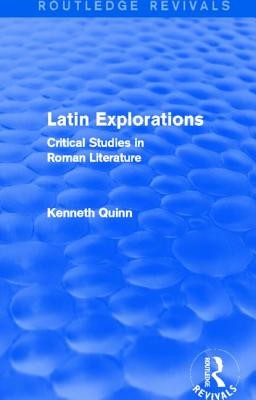
- Išsiųsime per 10–14 d.d.
- Autorius: Kenneth Quinn
- Leidėjas: Routledge
- ISBN-10: 1138014028
- ISBN-13: 9781138014022
- Formatas: 14 x 21.6 x 1.6 cm, minkšti viršeliai
- Kalba: Anglų
- Extra -15 % nuolaida šiai knygai su kodu: ENG15
Atsiliepimai
Aprašymas
Latin Explorations, first published in 1963, offers a fresh approach to Roman poetry from Catullus to Ovid. Traditionally, the period is divided for specialist studies - Lyric, Epic and Elegy. In each of them, techniques of interpretation prevail, isolated from contemporary ideas about poetry and dominated by barriers between 'textual', 'exegetical' and 'aesthetic' criticism.
Kenneth Quinn discerns in Roman poetry of this period the adolescence, maturity and decay of a single coherent tradition whose internal unity surpasses differences of form. His argument attempts to reverse the dissociation of purely academic research from appreciative criticism, whilst also incorporating the work of textual scholars. Each chapter is supported by a detailed analysis of the texts: nearly 700 lines of poetry are discussed and translated.
Latin Explorations will be of significant value not only to students of the Classics, but also to the 'Latinless' general reader who is interested in Roman literature.
EXTRA 15 % nuolaida
Kupono kodas: ENG15
Akcija baigiasi už 18:08:21
Nuolaidos kodas galioja perkant nuo 10 €. Nuolaidos nesumuojamos.

- Autorius: Kenneth Quinn
- Leidėjas: Routledge
- ISBN-10: 1138014028
- ISBN-13: 9781138014022
- Formatas: 14 x 21.6 x 1.6 cm, minkšti viršeliai
- Kalba: Anglų
Latin Explorations, first published in 1963, offers a fresh approach to Roman poetry from Catullus to Ovid. Traditionally, the period is divided for specialist studies - Lyric, Epic and Elegy. In each of them, techniques of interpretation prevail, isolated from contemporary ideas about poetry and dominated by barriers between 'textual', 'exegetical' and 'aesthetic' criticism.
Kenneth Quinn discerns in Roman poetry of this period the adolescence, maturity and decay of a single coherent tradition whose internal unity surpasses differences of form. His argument attempts to reverse the dissociation of purely academic research from appreciative criticism, whilst also incorporating the work of textual scholars. Each chapter is supported by a detailed analysis of the texts: nearly 700 lines of poetry are discussed and translated.
Latin Explorations will be of significant value not only to students of the Classics, but also to the 'Latinless' general reader who is interested in Roman literature.





Atsiliepimai